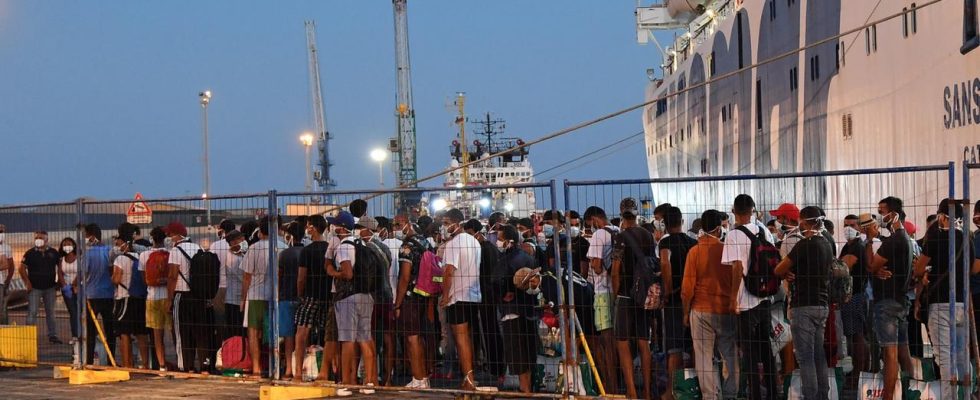faq
Interior Minister Faeser is expecting a breakthrough ahead of the discussions on reforming the EU asylum system. The federal government has apparently given up its blockade of the planned crisis regulation. What is it about – and what happens next?
Negotiations on EU asylum reform have been stalled for a long time – but today there could be progress in the discussions between the EU interior ministers. Federal Interior Minister Nancy Faeser was optimistic that the way for an agreement was now clear.
Chancellor Olaf Scholz also expressed his confidence: “We will adopt the new Common European Asylum System, which provides for a solidarity mechanism for the reception and distribution of refugees,” he told “Wirtschaftswoche”.
The federal government had previously rejected a core element of the reform, the so-called crisis regulation, primarily because of criticism from the Greens.
What are the reform plans about?
The planned asylum reform is intended, among other things, to limit irregular migration. The crisis regulation is part of it. For example, it stipulates that if there is a particularly strong increase in migration, the period during which people can be held in strict isolation can be extended. In addition, member states would no longer be obliged to take back asylum seekers for whom they are actually responsible but who have traveled on to another EU state.
The Greens in particular rejected the regulation because they fear that in crisis situations the protection standards for migrants could be lowered in a way that they consider unacceptable.
Why is there now movement in the negotiations?
Scholz apparently urged the cabinet on Wednesday that the crisis regulation should no longer be blocked. With this “power word” he gave Faeser leeway for the negotiations in Brussels. That should provide relief there – the EU Parliament sees the crisis regulation as a question of solidarity.
What do representatives of the traffic light coalition say?
Annalena Baerbock’s (Greens) Foreign Office only said on Wednesday: “Now negotiations are finally taking place properly in Brussels.” FDP parliamentary group leader Christian Dürr praised Scholz’s “clear stance”. There is “a unique opportunity to organize migration better overall, an opportunity that we cannot let pass,” he told the media service “Table.Media”.
SPD parliamentary group deputy Dirk Wiese is also hoping for an agreement in Brussels. The reform was “in Germany’s own interests,” he said ARD morning magazine. “We need stronger border protection, we need procedures at the external borders.” It is right that the federal government “has now clearly positioned itself here with the words of the Chancellor,” Wiese continued. “Failure would have been unjustifiable.”
What is the situation at the moment?
By the end of August, the Federal Office for Migration and Refugees registered more than 204,000 initial applications for asylum. This is an increase of 77 percent compared to the same period last year. In addition, more than a million people have fled Ukraine to Germany because of the war and do not have to apply for asylum.
Experience shows that even more asylum applications are registered in the second half of the year than in the first. CSU leader Markus Söder predicted in the “Augsburger Allgemeine”: “We are heading for 400,000 asylum applications in Germany.” This would be the third highest number measured in the Federal Republic – after 2015 and the peak year 2016 (745,545).
How could things continue now?
It was considered very unlikely in Brussels that the current draft of the crisis regulation could be significantly changed again before agreement was reached. As soon as this dispute has been resolved, negotiations with the European Parliament that are important for the reform can probably continue.
An agreement “by the end of the year” is possible, said the group leader of the conservative European party family EVP in the European Parliament, CSU Vice Manfred Weber, to the Bayern media group. This is particularly important because of the approaching European elections in June 2024. Projects that have not yet been negotiated with the governments of the member states could then be called into question again. Weber warned: “Anyone who still refuses to support the broad European consensus is partly to blame for the fact that solutions are being delayed and radicals are gaining strength.”
What other construction sites are there?
Faeser has also spoken out in favor of renewing the EU’s migration agreement with Turkey: “We need an update of the agreement,” she told the t-online portal. “We must now insist that what was agreed upon is adhered to again and renegotiate where necessary.”
There is also a dispute within Germany over the expansion of stationary border controls. So far, these controls, which have to be applied to the EU, only exist at the border with Austria. The Union is also demanding them for the border with Poland, where the number of migrants has risen sharply, and on the border with the Czech Republic. Faeser rejects this as personnel-intensive and ineffective. Instead, she only wants temporary and flexible controls there that do not have to be applied for in Brussels.
The head of the CSU member of the Bundestag, Alexander Dobrindt, called for “a word of power from the Chancellor on border controls.” Faeser is actively preventing the possibility of being able to refuse entry at the borders, he told the dpa.

